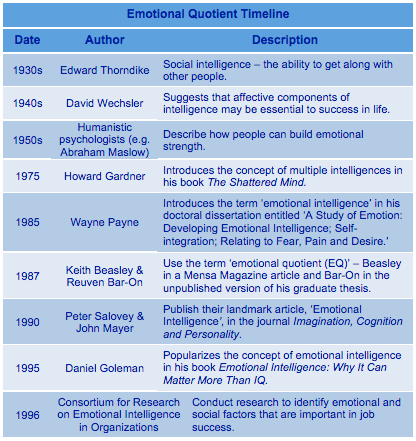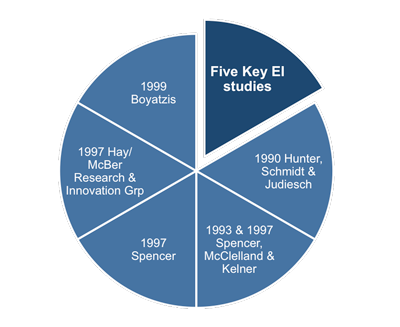Emotional Intelligence Timeline
To develop your own EQ it is important to understand the evolution of the concept of social or emotional intelligence. This knowledge must then be applied to suit the environment in which you work.
 |
The work of the Consortium for Research on Emotional Intelligence (EI) in Organizations has identified five key research studies that support the importance of an individual's emotional and social skills as important for success at work. An overview provided by the Consortium is shown below for each of these research studies.
Study 1 - Experienced partners in a multinational consulting firm were assessed on the EI competencies plus three others (Boyatzis, 1999). Findings:
• Partners who scored above the median on nine or more of the 20 competencies delivered $1.2 million more profit from their accounts than did other partners.
• 139% incremental gain.
Study 2 - An analysis of more than 300 top-level executives from 15 global companies showed that six emotional competencies distinguished stars from the average (Spencer, 1997). Findings:
• Distinguishing Emotional Competencies:
o Influence
o Team Leadership
o Organizational Awareness, Self-confidence,
o Achievement Drive
o and Leadership
 |
Study 3 - looked into the productivity of 'top performers' in jobs of medium complexity (e.g. sales clerks, mechanics) and the most complex jobs (e.g. insurance salespeople, account managers) (Hunter, Schmidt, & Judiesch, 1990). Findings:
• Top performers in medium complexity jobs were:
o 12 times more productive than those at the bottom.
o 85% more productive than an average performer.
• Top performers in the most complex jobs were:
o 127% more productive than an average performer
Competency research in over 200 companies and organizations worldwide into top performers suggests that (Goleman, 1998):
• one-third of this difference is due to technical skill and cognitive ability.
• two-thirds is due to emotional competence
• In top leadership positions, over four-fifths of the difference is due to emotional competence.
Study 4 - At L'Oreal, research (Spencer & Spencer, 1993; Spencer, McClelland & Kelner, 1997) showed that sales agents selected on the basis of certain emotional competencies significantly outsold salespeople selected using the company's old selection procedure. Findings:
• On an annual basis, salespeople selected on the basis of emotional competence sold $91,370 more than other salespeople did, for a net revenue increase of $2,558,360.
• Salespeople selected on the basis of emotional competence also had 63% less turnover during the first year than those selected in the typical way.
Study 5 - in a national insurance company research showed the difference in policy premium sold (Hay/McBer Research and Innovation Group, 1997). Findings:
• Insurance sales agents who were weak in emotional competencies (i.e. self-confidence, initiative, and empathy) sold policies with an average premium of $54,000.
• Insurance sales agents who were very strong in at least five of eight key emotional competencies sold policies worth $114,000.
If you want to find out more details on each of these five studies or to read the full paper written by Cary Cherniss, Ph.D. (Graduate School of Applied and Professional Psychology, Rutgers University) click on the URL of the Consortium for Research on Emotional Intelligence in Organizations.
You may also be interested in:
Understanding Emotional Intelligence | Goleman's Model of EI | Emotional Quotient (EQ) and IQ | Can EQ be Developed? | Personal Competence | Social Competence | EQ Framework.



